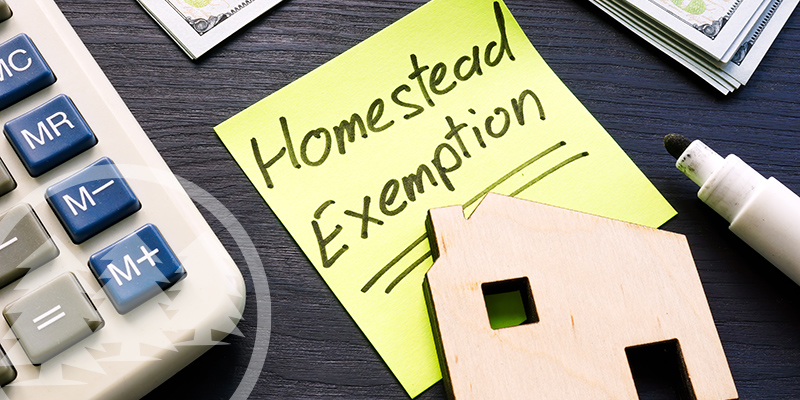There is a lot of confusion surrounding homestead exemption in HOAs. Some owners believe that gaining a homestead exemption means they are immune to HOA liens and the possibility of foreclosure. However, to understand how homestead exemption applies to HOAs, if at all, it’s important to first understand the law and who qualifies.
Homestead Exemption in HOAs: What Is It?
A homestead exemption reduces property taxes for homeowners. A portion of the home’s value is excluded from taxation, so homeowners pay lower taxes. Most states also offer it as a legal provision, protecting against some creditors if the owner declares bankruptcy or their spouse dies. Under the homestead law, surviving spouses receive ongoing relief from property taxes on a graduated scale. This way, homes with lower assessed values get the most benefit.
The homestead exemption offers financial relief and helps owners keep their homes. It can prevent the forced sale of a primary residence. However, it can’t prevent foreclosure if a homeowner stops paying their mortgage to the bank. A bank may still foreclose on a person’s home if they default on their mortgage.
It is worth noting that most states offer homestead exemptions. Meanwhile, some states have capped exemptions to a certain amount, typically $500,000.
How Does a Homestead Exemption Work?
 A homeowner may be able to apply for a homestead exemption if they wish to minimize the property tax on their primary residence. Eligibility requirements, application, and protection limits depend on the state.
A homeowner may be able to apply for a homestead exemption if they wish to minimize the property tax on their primary residence. Eligibility requirements, application, and protection limits depend on the state.
Calculations for homestead exemptions can also vary. Some use a flat reduction of all the taxable value of the home. Others use a percentage to determine the homestead property tax exemption. With the first method, lower-valued homes benefit from a bigger reduction. Homes with higher values, though, are better off with the second option.
Additionally, in some states, the homestead exemption is automatic, meaning all homeowners receive it. However, in other states, owners must apply or file a claim to receive it.
Keep in mind that the homestead exemption only applies to a person’s primary residence; hence, its name. If a person owns other properties, the homestead exemption does not apply to those. If a surviving spouse moves to their primary residence, they typically must refile the claim to receive the exemption.
How to Qualify for a Homestead Exemption
It is important to note that eligibility requirements vary from one state to another. Some states give the exemption to all homeowners. That said, most states offer the homestead exemption to the following:
- Persons with disabilities
- Veterans
- Senior citizens
- Law enforcement officials or first responders with disabilities
- Low-income citizens
In addition to these basic qualifications, some states also place a limit on the value of a home that may qualify for the exemption. There may also be other requirements depending on the state or county. It is best to check with the local tax assessor to confirm the details.
As mentioned above, some states require owners to file or apply for a homestead exemption. Forms may often be accessed online through the tax assessor’s website. Make sure to file claims before the deadline to qualify.
Does Homesteading in HOAs Prevent Foreclosure?
Homeowners associations are known for collecting dues and assessments. Members of an HOA community must diligently pay these fees to remain in good standing and receive full privileges. Moreover, defaulting on these payments can lead to legal action, liens, and even foreclosure.
When a homeowner defaults on their HOA fees, the association typically places a lien on their property. This lien makes it difficult for the owner to sell their home. Furthermore, the association can subsequently foreclose on the lien to satisfy the owner’s debt to the HOA.
While the homestead exemption reduces property taxes and offers protection against some creditors, it does not apply to HOAs and condos. In the same way that the exemption won’t stop banks from foreclosing, the exemption also won’t stop associations from initiating foreclosure proceedings if the owner stops paying their dues. Thus, even if an owner in an HOA has a homestead exemption, the HOA can still foreclose on their home.
The Importance of HOA Dues
 Homeowners living in HOA or condo communities have an obligation to pay dues. They agree to fulfill this obligation when they first buy into the neighborhood, essentially signing a contract with the association. In doing so, they also agree to the potential consequences of defaulting on these dues.
Homeowners living in HOA or condo communities have an obligation to pay dues. They agree to fulfill this obligation when they first buy into the neighborhood, essentially signing a contract with the association. In doing so, they also agree to the potential consequences of defaulting on these dues.
Dues play a critical role in an HOA or condo association. These dues serve as the association’s primary source of revenue. The association then uses these funds to pay for various expenses within the community. While these expenses can differ from one association to the next, they usually include the following:
- Maintenance expenses
- Insurance premiums
- Cleaning fees
- Utilities
- Landscaping costs
- Management fees
Since all members benefit from these things, it makes sense for all members to share the expenses, too. After all, members can’t enjoy common areas and amenities if the association lacks the funds for maintenance and upkeep. Given how important dues are, it makes sense that nonpayment should come with real consequences. One of them is the possibility of foreclosure.
Membership in an HOA is typically mandatory. As such, the only way to avoid paying dues is to sell the home and move out of the community.
Homestead Exemption in HOAs: Explained
While a homestead exemption offers a variety of advantages to homeowners, protection from HOA liens and foreclosure is not one of them. If an owner wishes to prevent foreclosure, they should make sure to keep up with their obligations to the association, including paying their dues on time.
Homeowners associations can be a challenge for an inexperienced board. Hiring an HOA management company is a good solution. Call us today at (877) 252-3327 or contact us online to request a free proposal!
RELATED ARTICLES:
- Can The HOA Board Raise HOA Dues If It Wasn’t Voted On By Homeowners?
- HOA Dues Payment Plan: Should You Offer It To Delinquent Homeowners?
- Can An HOA Board Make Homeowners Remove Security Cameras?






